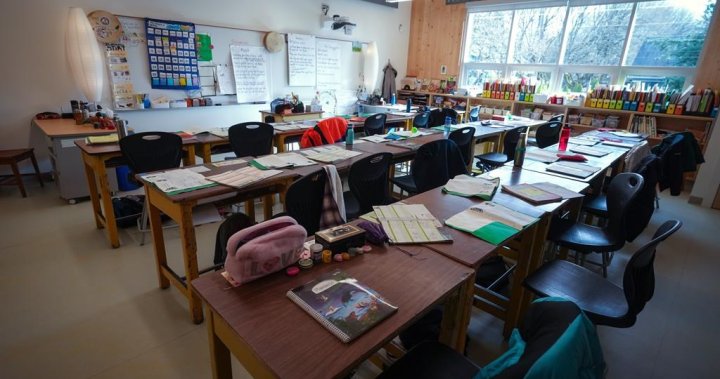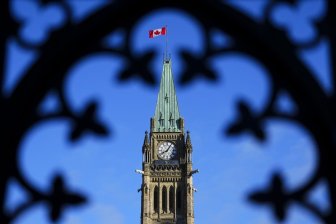Student violence on teachers is a growing concern. What can be done? – National | Globalnews.ca
Even as Canada’s teacher shortage continues to impact schools across the country, educators and those that represent them say one of the factors causing departures from the profession is the abuse or violence some face in classrooms.
The numbers vary from province to territory, as does the severity of the incidents reported. The broader trend, according to education professionals, is growing fear and exhaustion.

“They’re just tired of being sworn at and threatened, even if it’s not a real threat,” said Ted Hupé, president of the Yukon Association of Education Professionals. “When you have a primary child lashing out in that way, people tire of it and they choose not to be part of that.”
Saskatchewan Teachers’ Federation president Samantha Becotte told Global News that a survey of their members showed about 30 per cent having experienced violence or abuse in the last five years with the types of abuse varying from physical harm to substances being dropped into teachers’ beverages.
“We’ve heard instances of things being dropped into a teacher’s drink or their coffee, which isn’t physical violence, but obviously is significantly harmful to teachers and can be potentially very dangerous,” she said. “We’ve heard about broken bones, we’ve heard about black eyes and bloody noses that have been a result of this violence.”

With mounting concerns of such cases, union leaders and teachers say there are multiple issues at hand that need to be addressed.
Ontario Secondary School Teachers’ Federation president Karen Littlewood said among the issues faced is not enough support staff — such as child and youth workers or psychologists.
This is leaving teachers having to act as more than just teachers, she says.
“We’re continually being asked to do more with less,” she said. “Teachers shouldn’t have to also be social workers or psychologists or child and youth workers. We’re not trained to do that.”
She said by having more help, it would allow schools to better identify issues students are facing early on and provide the supports before potential problems arise.

Littlewood said her most recent position prior to becoming the union’s president was teaching about 10 students with developmental disabilities and autism.
When she began that role, she said there were four people in the classroom helping the students, but when she left there was barely half that number of educational assistants to support the class.
The need for more financial support from governments is echoed by various educators that Global News spoke with. Nova Scotia Teachers Union President Ryan Lutes saying he wants to see a “system-wide analysis” of the problem.
From there, he said recommendations could be crafted on how to address the issues of abuse and violence and how to potentially find a solution.
“It’s absolutely unacceptable that way too many folks feel that violence is part of being a teacher,” he said.
Part of a renewed focus needs to be around mental health, he said.
“What I hear a lot of from teachers is oftentimes a student that (is) violent (isn’t) getting the support they need. They have a complex set of needs,” he suggested.
“I have to believe in my heart that kids don’t want to be violent, especially our younger students. As a teacher, as a parent, you’re never going to not get me to believe that. So the supports need to be there…students who can be violent and students with educational, behavioural needs, they intersect.”

Hupé said it’s also about supporting youth who come from difficult situations.
He said in the Yukon, they see a generally high rate of substance abuse.
“When children are suffering within a family unit, it shows in the school,” he said.
Global News reached out to all 13 provinces and territories’ education departments to ask what is being done to better support and protect educators.
Saskatchewan, Nova Scotia, Manitoba, Quebec and Ontario each noted that funding has been committed toward various initiatives, including hiring classroom and support staff, and mental health resources for students.
Manitoba and Saskatchewan also pointed out that their schools must follow codes of conduct around creating and maintaining safe learning environments.
Alberta said in a statement that school authorities had access to “Respect in School” training, an online program focused on preventing bullying, abuse, harassment and discrimination.
New Brunswick said funding is provided to school districts for training, including violence-threat risk assessments, non-violent crisis intervention, and trauma-informed practices.
B.C. also has programs in place to address violence, such as having safe-school coordinators that are to be contacted over individuals “continually causing concerns.” WorkSafeBC collaborates with education representatives to find the best methods of preventing or minimizing risks of violence.
Northwest Territories wrote that it has put in place multiple supports for student mental health, including a child and youth counsellor program and establishing school-based mental health positions in schools. A spokesperson also said that it was working with education superintendents to develop a “profile of school violence” to help determine where there are gaps in services for students.
Nunavut said in October of last year it worked with the territory’s Teachers’ Association to launch a violence reporting and tracking system. That system since Oct. 1, 2022 until June of this year, has seen 245 violent incidents reported. Of these, 89 were student-on-student incidents, while 107 were student on staff. There were also 19 staff-on-staff cases, with one case of a staff-on-student violent incident.
However, in addition to this, there were 146 cases classified as “other,” which the department of education classifies as reports not involving staff or students, or the target of violence was not identified. The tracking system also identified that 42 incidents resulted in personal injuries, though it does not specify if it was staff or students who were injured.
Global News did not hear back from government officials in Newfoundland and Labrador or Prince Edward Island, Yukon by the time of publication.
While unions and organizations representing teachers have tracked incidents, there are still concerns over underreporting as it may prevent solutions from being found.
“Underreporting does not allow anyone to have an open, honest discussion,” Hupé said. “If we’re not using the same facts or the same statistics, we’re not looking at the problem in the same manner. And that is really the ultimate reason for us to keep track of stats so that we can actually have these honest discussions.”
For all the latest health News Click Here




